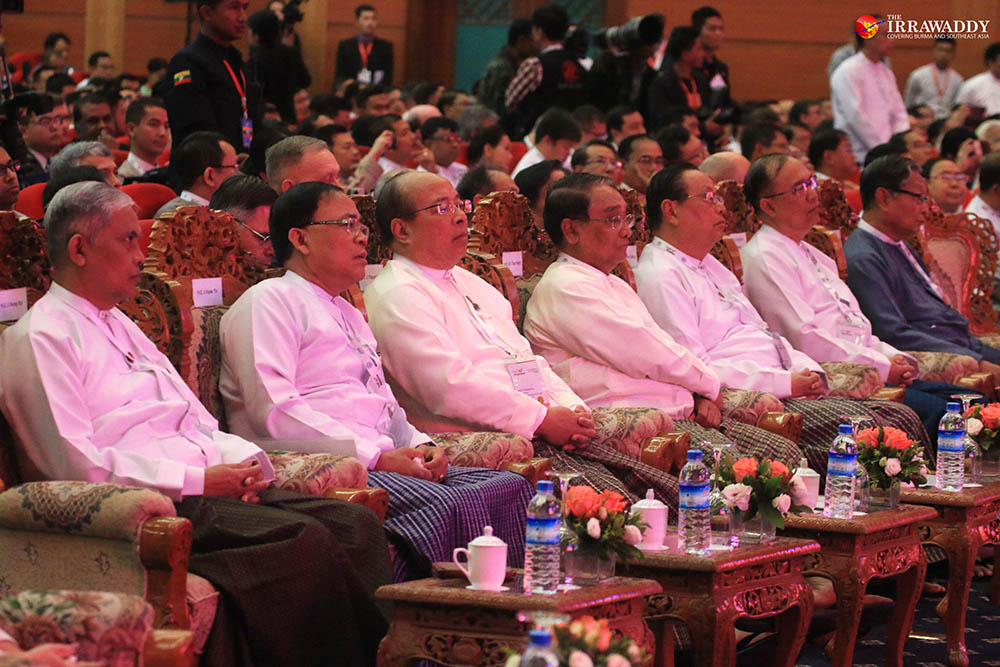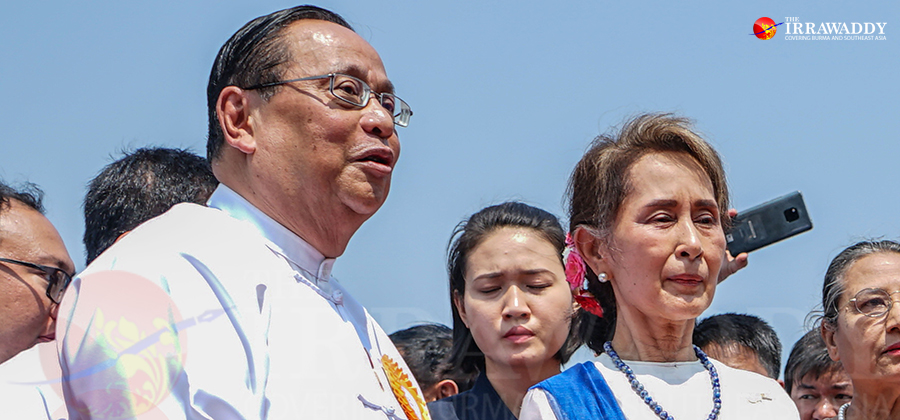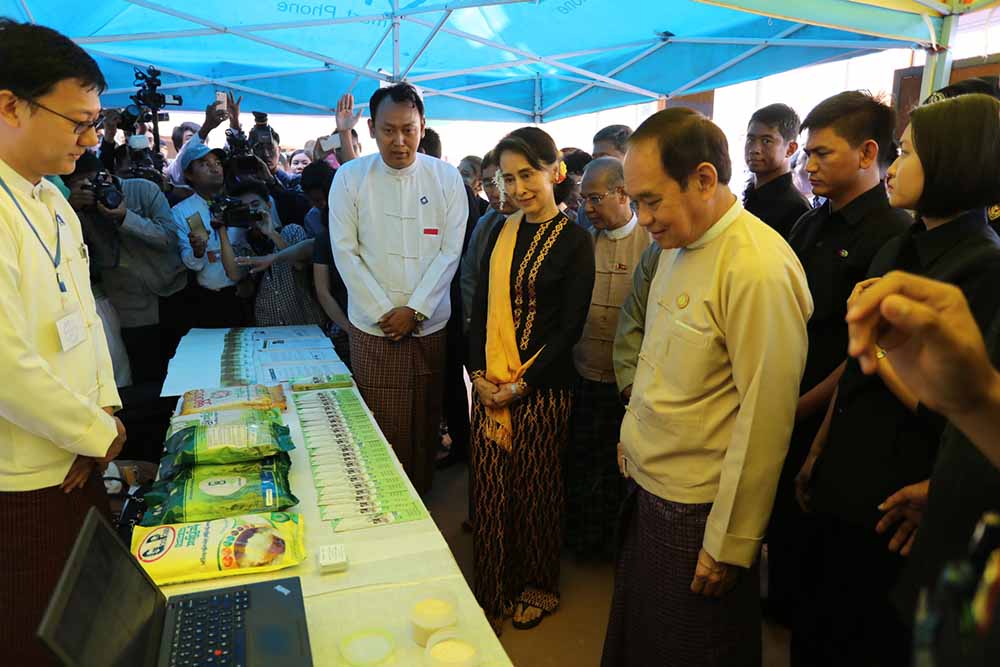YANGON—Following its win in the Nov. 8 general election, all eyes are on the National League for Democracy (NLD) to see whether it will appoint competent people to the new government’s cabinet, and not repeat the mistakes it made in 2016.
After it first came to power in March 2016, the Daw Aung San Suu Kyi-led NLD government was criticized for its failure to choose the right people for the majority of the portfolios in its cabinet.
NLD leaders have admitted that their selection of candidates for minister positions was rushed in 2016, leading to many poor government appointments.
At a press conference last week, NLD vice chairman Dr. Zaw Myint Maung said the party would introduce reforms to fix the problem of poor cabinet appointments that beset the government during its first term.

While the NLD remains tight-lipped on whether specific incumbent ministers would be reappointed or removed, the party’s spokesperson Dr. Myo Nyunt told The Irrawaddy on Tuesday that NLD leaders will seriously consider input from the public on the performance over the past five years of all current cabinet members when making its selections.
Looking at the NLD-led government’s performance in its first term, nearly two thirds of the ministers from 21 ministries have disappointed the public due to their weak performances and lack of capacity. (The three cabinet ministers constitutionally appointed by the commander-in-chief of defense services—the ministers of defense, home affairs and border affairs—are not counted here.)
Two ministers who have managed to impress the public with their performances over the past five years are Minister of Social Welfare, Relief and Resettlement Dr. Win Myat Aye and Minister of Health and Sports Dr. Myint Htwe, both of whom Daw Aung San Suu Kyi has publicly praised on more than one occasion. Minister of the Office of the State Counselor U Kyaw Tint Swe and Minister of the Office of the Union Government U Min Thu are also among her apparent personal favorites in the cabinet. U Min Thu has been tasked with reforming the formerly military-controlled General Administration Department.
In addition to being State Counselor, Daw Aung San Suu Kyi herself holds two ministerial positions, leading the Ministry of Foreign Affairs and the Ministry of the Office of the President.
Some observers have also given high marks to the minister of planning, finance and industry and the minister of investment and foreign economic relations.

Minister for Religious Affairs U Aung Ko has proven instrumental in clamping down on ultranationalist Buddhist groups such as the now defunct Ma Ba Tha and pursuing legal action against the detained firebrand nationalist monk U Wirathu, despite his tainted reputation as a member of the former military government. And Minister of Labor, Immigration and Population U Thein Swe—who like U Aung Ko is a member of the USDP—has failed to introduce significant reforms to tackle the longstanding corruption in departments under the ministry.
Those with the worst reputations are Minister of Information Dr. Pe Myint and Deputy Minister U Aung Hla Tun; Minister of Ethnic Affairs Nai Thet Lwin; and Minister of Agriculture, Livestock and Irrigation Dr. Aung Thu. They have been criticized as the cabinet’s most incompetent and least active ministers.
“I would say the Information Ministry is the worst. The ministry that should be the most active has been the quietest,” former lawmaker and political analyst U Ye Tun said.
Leading writer and activist Ma Thida agreed, saying that no one—not the public, the country or the government itself—had felt the benefit of the continued existence of the Information Ministry over the past five years. Many media personnel and activists have long called for it to be scrapped.
“The ministry was unable to improve the image of the country during times of crisis, or the image of the government. It has neither promoted the government’s actions nor supported the public’s right to know.”
Dr. Aung Thu, a former rector of Rangoon University who was initially tipped to become education minister but was instead appointed to the Agriculture, Livestock and Irrigation portfolio, has been criticized by many people who work in the sector as not understanding the issues and performing poorly. Soon after his appointment, the minister became embroiled in a quarrel with his deputy, Dr. Tun Win, an agricultural expert with 40 years of experience, over the latter’s proposals for the country’s agricultural sector. The spat ended in the deputy minister being fired.

Education Minister Dr. Myo Thein Gyi, Construction Minister U Han Zaw, Minister of Hotels and Tourism U Ohn Maung, Minister of Electricity and Energy U Win Khaing and Minister of Natural Resources and Environment Conservation U Ohn Win all failed to impress the public and were regarded as weak. Some were involved in controversies over their handling of public funds and approval of projects.
Renowned environmentalist U Win Myo Thu said the Ministry of Natural Resources and Environmental Conservation had largely failed in its goal of policy reform. He said that many of the ministry’s efforts failed to bear fruit, including in the areas of forest restoration and development, enforcing rules and regulations in the mining sector, and environmental conservation.
Many are hoping the NLD will avoid a repeat of the mistakes it made in 2016 in terms of appointing the wrong candidates to the cabinet.
“Negotiations and discussions over candidates are ongoing; only a few positions have been decided. What I can say is that the party will try harder to get the right people in the right positions this time,” NLD spokesperson Dr. Myo Nyunt said on Tuesday.
While the NLD’s commitment to getting its candidates right this time is being lauded, critics say the party’s ability to speedily correct appointment mistakes once they become apparent in the new term will be just as important.
You may also like these stories:
NLD Reaches Out to Myanmar’s Ethnic Parties Seeking Federal Union and an End to Civil War
Forget Knocking on Doors: Open a Facebook Account—the New Way to Campaign in Myanmar Amid COVID-19
Myanmar’s Ruling Party Says Kayah State Chief Minister Removed Over ‘Personal Grudge’

















